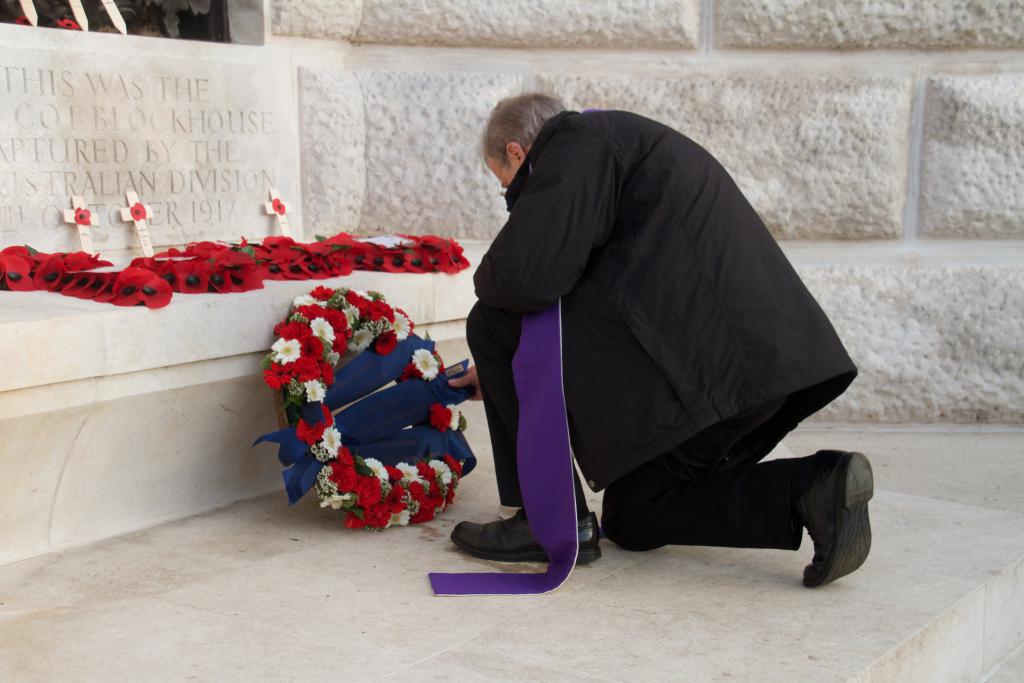by Bishop Nicholas Hudson
I’d like to share with you two experiences I’ve had in the period since Article 50 was triggered which have brought home to me what it means to be Christian and European in a post-referendum UK.
The first was to visit Ypres with 27 bishops from the EU member-nations at the time of the Armistice centenary. We went as members of COMECE, the Commission of Roman Catholic Bishops’ Conferences of the European Union.
It was deeply poignant to visit first of all the German cemetery and to be led in prayer by the German Bishop of the Forces for all those who had fallen in the First World War, before proceeding to Tyne Cot where we prayed in a similar spirit for all those British and Commonwealth heroes who made the supreme sacrifice in Flanders Fields.
The other memorable experience occurred during a conference in Rome entitled ‘Re-thinking Europe’, marking 60 years since the Treaty of Rome. The organisers had been inspired to make a break in the programme for us to visit Sant’Egidio.
More than any of the intellectual exchanges heard, it was being served my supper by a young man with intellectual disabilities which brought home to me what we should be focused on.
His name was Paolo and he has Down’s Syndrome.
‘Paolo’s very precious to us,’ they told me, ‘because his mother was under great pressure to have him aborted. But we told her we would help her look after him; and she took us at our word. Now he’s the one who welcomes visitors in our name!’
I mention these two experiences because they speak to me so loudly of what I believe the churches in the UK are being called to as we prepare to take our leave of the EU.
I believe, firstly, we’re being called to affirm Europe as a Peace Project, regardless of whether we belong to the EU or not; and, secondly, to affirm that, in Europe, Christians count the way we treat the most vulnerable people as key to what it means to be human.
I believe these times call us to proclaim Christianity much more explicitly: to proclaim a Christianity which contrasts with the ‘Christianism’, rightly identified as characterising the UK’s main political parties; to proclaim a Christianity which announces the prophetic, priestly and kingly offices of Christ, and places them front of stage in the response we offer as churches to the challenges posed by Brexit.
Sant’Egidio placing Paolo centre-stage gave eloquent testimony to this, I felt. Paolo also prepared the way for Pope Francis the next day to call the Christians of Europe to keep the human at the centre of all our concerns.
What Europe needs from the churches, said Pope Francis, is community. The churches need to build communities which place at their hearts the most vulnerable members of society and, in this way, call all men and women of goodwill to keep the human at the centre of all their deliberations.
We, as churches, have the potential to be real hubs for the localities in which we stand, announcing our presence in a mass of great buildings, uniting a diversity of groups through common vital endeavours which transcend difference.
We’re not, and never shall we become, party political but we have, at this time of political turbulence, not just a right but a duty to proclaim more loudly than ever the Christian values which should inform UK society’s adaptation to leaving the EU.
I would like to conclude with three more observations:
First, we need, as churches in England and Wales, to worry about Ireland; worry about maintaining the Good Friday Agreement; ask ourselves what we may need to say or do to play our part as churches to uphold it in this fragile time of transition and backstop.
Secondly, we must, as church, denounce hate crime of any sort. 2017 saw a 17% increase in levels of hate crime in the UK. We should surely amplify the calls from the World Council of Churches and the Vatican Dicastery for Promoting Integral Human Development to stand against a rising tide of xenophobia, racism and populist nationalism.
As churches, we need surely to think how, in England and Wales, and alongside the churches of Scotland and Northern Ireland, we can promote the common good of the UK; and indeed challenge any hostility or suggestions of superiority between one nation and another, except at rugby, of course!
Thirdly, we need as churches to give radical witness in the whole area of how non-British Europeans are treated in the UK. I would like simply to suggest that we are well-placed, as churches in England and Wales, to communicate what is surely our Christian belief that non-British Europeans are an integral and valued part of our parishes, schools and communities; and that any anti-European rhetoric towards them should be heavily resisted.
This too speaks loudly and eloquently to the need to keep the human, before any economic, legal or political considerations, at the heart of all our concerns. And this is a conviction which should surely characterise the churches of England and Wales at all times, but at this time more urgently than ever!
This is an abridged version of a talk given at the joint meeting of Anglican and Roman Catholic Bishops in Leicester on 14th January.




